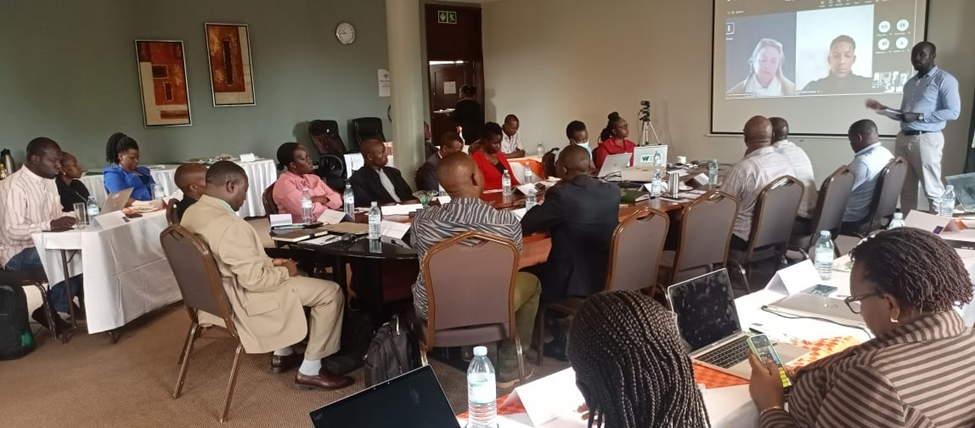
Wildlife Conservation Society held the United States Agency for International Development (USAID)/Uganda Combating Wildlife Crime (CWC) Activity Annual Pause and Reflect Meeting at the Protea Hotel on September 29 and 30, 2022. The meeting's objectives were to review accomplishments and progress, highlight challenges and mitigation measures, adopt lessons learned and make implementation plans for the next reporting year. Some members of the National anti-Wildlife Crime Coordination Task Force (NWCCTF), including the Uganda Wildlife Authority (UWA), National Forestry Authority (NFA), Uganda Civil Aviation Authority (UCAA), Uganda Revenue Authority (URA), INTERPOL, NEMA and the External Security Organization (ESO), as well as staff from the Wildlife Conservation Society (WCS), African Wildlife Foundation (AWF), Natural Resources Conservation Network (NRCN), and The Royal United Services Institute (RUSI) in the United Kingdom, attended the meeting.
The Activity shared several accomplishments including the organization of the Africa Regional Forum on Combating Wildlife Crime in Uganda on February 8 and 9, 2022, which was well attended by 109 participants from Uganda, Kenya, Tanzania, Somalia, Eritrea, Nigeria, Botswana, South Africa, Algeria, Djibouti, the United Kingdom, and China. Following the forum, two consultative meetings were held with the Uganda Wildlife Authority and the Ministry of Tourism, Wildlife and Antiquities, resulting in the development of actionable interventions and the identification of organizations to implement the forum recommendations.
The Activity additionally, supported the creation of an electronic permit system to replace the paper-based certification and permit issuance system, rid the system of forgeries, and speed up the processing and verification of requests to trade in legal wildlife and wildlife products. Through the new online permit system, more than 150 permits have already been issued.
Twenty-five senior staff from UWA received training that has improved their capacities to obtain, analyze, and report wildlife crime information. First responders have also received training to manage wildlife crime scenes and enhance the prosecution of suspects by supplying reliable evidence in court. Additionally, five sets of crime scene kits were given to UWA by the Activity to enhance UWA's capacity to manage wildlife crime scenes.
To further strengthen the prosecution of wildlife crimes, the Activity is supporting the development of a draft training manual on wildlife legislation with the Judicial Training Institute. The Activity is also increasing awareness of wildlife crime by organizing moot courts (mock trials) with Makerere University law students. To promote comprehension of wildlife legislation among key stakeholders, the Activity has also created simplified versions of pertinent wildlife statutes.
Furthermore, the Activity has established a beehive fence to address human-animal conflict, a primary local cause of wildlife crime. These communities have also received 336 hives and beekeeping training, which has enabled them to produce 368 kg of honey from the last two harvesting seasons of the previous year, earning a total of 3,680,000 Uganda Shillings (USD 979).
"After taking the beekeeping course, we developed our beekeeping skills and have become community consultants. We are helping more than 42 local farmers manage their apiaries successfully,” said the Can Dag Goro Beekeeping Group's secretary, Ojok Gilbert. He further explains that while the beehive barrier has been successful in keeping elephants out of the communities, beekeeping has also created an alternative source of revenue for the poaching-prone communities adjoining Karuma Wildlife Reserve.
The Activity has continued to support operations to prevent wildlife crime through the Karuma Canine Unit, which recently seized 69 kgs of ivory, 6 kgs of pangolin scales, 3.5 kgs of hippo teeth, and 155 kgs of bushmeat in August 2022 and arrested fifteen criminals who were arraigned in the courts of law.
“These successes only make up a part of the solution to the problem. The Activity will further improve the capacities of relevant institutions in terms of financial and operational intelligence, investigations, and prosecutions to fight wildlife crime. The Activity will also strive to collaborate with other like-minded NGOs, private and public sectors to disrupt wildlife trafficking networks along the entire illegal wildlife trade (IWT) value chain rather than concentrating on low-level criminal actors alone,” said Geoffrey Mwedde, Chief of Party of the USAID/Uganda Combating Wildlife Crime Activity.
The WCS Country Director, Dr. Simon Nampindo, explained that "wildlife crime is a complex issue because it also affects offenders' livelihoods and traditional livelihoods of hunting and gathering”. He advised that all stakeholders adopt a multisectoral approach to leverage their interlinkages. “It is also imperative to evaluate efforts from time to time to determine whether we are progressing or regressing,” he added.